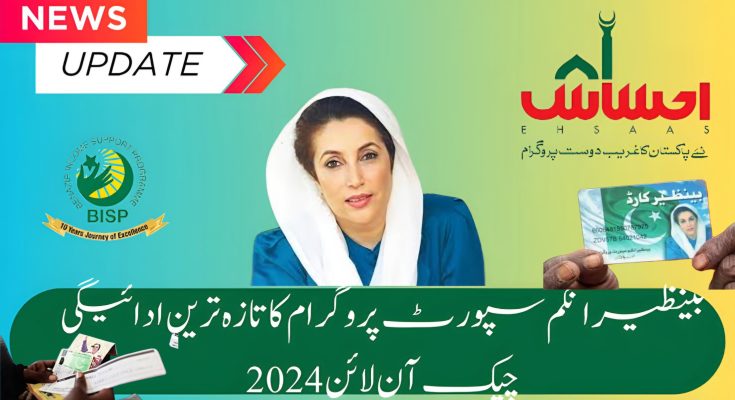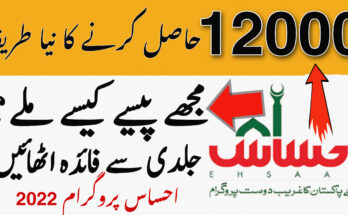The Benazir Income Support Program 2024 Updates. The government of Pakistan launched the historic Benazir Income Support Program (BISP) with the goal of empowering the most vulnerable citizens of the nation and eradicating poverty. Benazir Bhutto, the first female head of a democratic government in a predominantly Muslim country, was honored with the launch of BISP in July 2008. Pakistan’s endeavors to furnish social safety nets and foster economic stability have made noteworthy progress with the implementation of this program. The present article explores the inception, goals, workings, and effects of the BISP, emphasizing its contribution to the betterment of people’s lives throughout Pakistan.
Sources and Goals
A strong social safety net was required to safeguard Pakistan’s most vulnerable citizens, which is where the Benazir Income Support Program got its start. The Pakistan People’s Party (PPP), led by Asif Ali Zardari, who assumed office after Benazir Bhutto’s murder, unveiled the program. By giving financial aid to the most underprivileged members of society, BISP fundamentally seeks to reduce poverty, encourage economic growth, and advance women’s empowerment.
Among BISP’s principal goals are:
- Alleviating Poverty: The Bilateral Investment and Savings Program (BISP) aims to lower poverty by giving the poorest households unconditional cash transfers.
- Encouraging Women: The program’s primary beneficiaries are women, who are thus encouraged to participate more actively in household decision-making and to advance gender equality.
- Stability of the Economy: The Bank of Ireland System’s (BISP) infusion of cash into the economy increases demand for products and services, which in turn propels economic growth.
- Safety for Society: For people who are unable to work because of age, a disability, or other circumstances, BISP acts as a safety net, guaranteeing them a minimal degree of financial stability.
Procedures and Execution
To guarantee that assistance reaches those who need it most, BISP implementation entails a careful procedure. To determine which households qualify for the program, a poverty scorecard system, community-based targeting, and geographic targeting are combined. One important tool for evaluating the socioeconomic standing of households is the poverty scorecard, which takes into account a number of factors like asset ownership, household size, and education level The Benazir Income Support Program 2024 Updates
After being identified, recipients get monthly cash transfers via mobile banking, smart cards, and post offices, among other channels. Over time, adjustments have been made to account for inflation and shifting economic conditions, resulting in varying levels of financial assistance granted to each household. Technology-enabled services like mobile banking and biometric verification have proven crucial in cutting down on leaks and guaranteeing transparency in the money transfer process.
Effects on Economic Growth and Poverty
Pakistan’s economic growth and efforts to combat poverty have benefited greatly from the Benazir Income Support Program ever since it was established. Numerous assessments and research indicate that by giving them a steady source of income, BISP has been effective in bringing millions of households out of extreme poverty. The beneficiaries’ overall quality of life has improved as a result of the financial assistance they received in meeting their basic needs, which include clothing, food, and housing.
Additionally, the promotion of children’s healthcare and education has been greatly aided by BISP. Families that receive funding from the BISP are more likely to make investments in the health and education of their kids, ending the cycle of poverty and paving the way for opportunities for upcoming generations. Additionally, by boosting consumer spending, which boosts regional economies and creates jobs, the program has helped to stabilize the economy.
Encouraging gender equality and empowering women
The Benazir Income Support Program’s influence on women’s empowerment is among its most noteworthy accomplishments. Through the primary designation of women as cash transfer recipients, the Bank-Insurance Service Program (BISP) has improved women’s financial autonomy and household decision-making authority. With women in Pakistan historically facing substantial social and economic barriers, this change has profound effects on gender equality in that country.
With more financial resources at their disposal, BISP-eligible women are more likely to engage in jobs that pay well, contribute to their kids’ education, and use healthcare facilities. In addition, by promoting women’s involvement in local affairs and decision-making, the program has promoted greater social inclusion. In addition to helping the particular recipients, this empowerment of women advances the nation’s larger development objectives.
Obstacles and Prospects for the Future
The Benazir Income Support Program has experienced success, but it still faces a number of obstacles. There are still issues with ensuring precise targeting and stopping fraud. While some of these problems have been addressed by the use of technology and data analytics, ongoing efforts are required to increase the program’s efficacy and efficiency.
BISP’s financial viability presents another difficulty. Getting sufficient funding is a continuous struggle because of the size of the program and the resources needed to support millions of beneficiaries. The government must strike a compromise between the necessity of social protection and fiscal restraint, looking into creative funding sources and joint ventures to keep the program going and grow it.
Future developments could see BISP develop into a more complete social safety net. A more comprehensive strategy for reducing poverty may be developed by combining BISP with other social services like healthcare and education. Furthermore, extending the program’s reach to encompass entrepreneurship assistance and vocational training can aid in the beneficiaries’ shift from reliance to independence.
Conclusion
Pakistan’s dedication to both social justice and economic development is exemplified by the Benazir Income Support Programme. In addition to reducing poverty, BISP has empowered women and boosted economic stability by giving financial support to the most vulnerable members of society. With further development, the program has the potential to change people’s lives and create a more prosperous and inclusive Pakistan.


12 Comments on “The Benazir Income Support Program 2024 Updates”
Comments are closed.